Jann Gilbert (National Marine Science Centre, Southern Cross University, Coffs Harbour, New South Wales, Australia) and colleagues have published on-line in the open-access journal Marine Ornithology on levels of plastic items in stomachs of stranded Short-tailed Shearwaters Puffinus tenuirostris and other Australian seabirds that subsequently died. A single Wandering Albatross Diomedea exulans examined contained no plastic.
The paper’s summary follows:
“Plastic pollution is a significant problem in all oceans of the world and accounts for up to 90% of marine debris. Ingestion of plastic by seabirds and its effects are well documented, particularly in the Northern Hemisphere. However, fewer data exist for levels of plastic in seabird and coastal bird species in Australian waters or the southwestern Pacific. In this study, the stomach contents of a variety of seabirds and coastal birds (migratory and resident) were analysed for plastic. Nine (30%) of the birds sampled contained plastic. The median mass of plastic per bird was 41.7 mg and median number of pieces was 3.0. Shearwaters Puffinus spp. had significantly higher plastic mass and number of pieces than other species, and the most common type of plastic was manufactured. However, industrial pellets also contributed substantially. Plastics were primarily dark in colour. No clear indication of the influence of plastic ingestion on body condition could be found, however, internal physical damage and intestinal blockage was noted. Further assessment of the incidence and the effects of plastic ingestion in seabird and coastal bird species in Australian waters is required.”

Short-tailed Shearwater, photograph by Kirk Zufelt
Reference:
Gilbert, J.M., Reichelt-Brushett, A.J., Bowling, A.C. & Christidis, L. 2016. Plastic ingestion in marine and coastal bird species of southeastern Australia. Marine Ornithology 44: 21-26.
John Cooper, ACAP Information Officer, 09 March 2016

 English
English  Français
Français  Español
Español